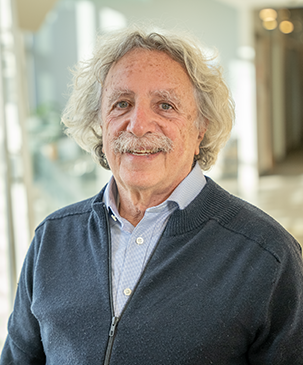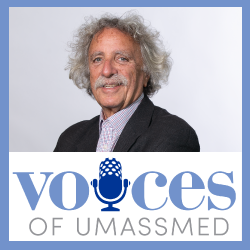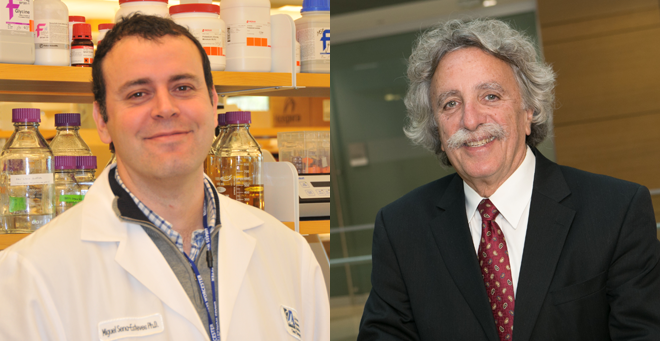
The 2023 Gruber Genetics Prize is being awarded to molecular biologists Allan Jacobson, PhD, of UMass Chan Medical School, and Lynne Maquat, PhD, of the University of Rochester School of Medicine and Dentistry, for their contributions in identifying and describing the mechanism of nonsense-mediated mRNA decay (NMD). This complex cellular pathway targets mRNA transcripts containing premature stop codons for degradation, thus preventing the formation of truncated, possibly toxic protein fragments.
As they have also shown, NMD acts as a mechanism by which a cell can respond to environmental changes. Working independently, these two researchers changed the understanding of the role that mRNA regulation plays in ensuring the proper workings of a cell.
“Scientists who are awarded the Gruber Prize represent some of the most distinguished and influential thinkers in the world and we couldn’t be prouder to count Dr. Jacobson among their ranks,” said Terence R. Flotte, MD, the Celia and Isaac Haidak Professor, executive deputy chancellor, provost and dean of the T.H. Chan School of Medicine. “Dr. Jacobson and his co-recipient, Dr. Maquat, are to be congratulated. The true beneficiaries of their work—which has deepened our understanding of nonsense-mediated mRNA—include the global scientific community and those who may one day live longer, healthier lives as a result of their contributions.”
“I’m extremely grateful to the Gruber Foundation for this prize, humbled to be in the company of so many distinguished geneticists who were prior recipients, and indebted to the creativity and commitment of the terrific grad students, postdocs and technicians who have worked in my lab over more than four decades,” said Dr. Jacobson, the Gerald L. Haidak, MD, and Zelda S. Haidak Professor in Cell Biology and chair and professor of microbiology & physiological systems.
The Gruber Genetics Prize, which includes a $500,000 award, will be presented at the International Congress of Genetics in Melbourne, Australia, on July 19.
“Their discoveries of the molecular components and mechanism of nonsense-mediated mRNA decay have been paradigm shifting, in our understanding of how cells avoid expression of potentially deleterious mRNA transcripts, and in the genetics of human disease,” said Philip Hieter, professor in the Michael Smith Laboratories at the University of British Columbia and a member of the selection advisory board for the prize.
Through his yeast genetic studies, Jacobson identified the core components of the nonsense-mediated mRNA decay pathway, demonstrating the role that UPF proteins play in targeting mRNAs with a premature stop codon for degradation. He was also able to demonstrate the role this pathway plays as a quality control checkpoint for mRNAs with a premature stop codon, whether due to a mutation or gene expression errors.

Through her studies of patients with hemolytic diseases, Dr. Maquat demonstrated the importance of nonsense-mediated mRNA decay in humans by showing that mRNAs with a premature stop codon were more unstable. She went on to elucidate NMD mechanisms in mammalian cells and also showed that NMD acts to eliminate faulty transcripts that are the byproduct of routine errors in human gene expression, and that cells use NMD to adapt to changes in environment, through the fine-tuning of approximately 5 to 10 percent of mRNAs.
Already, through the work of Jacobson and Maquat, these discoveries have had implications in treating human diseases such as Duchenne muscular dystrophy and Fragile X syndrome.
“As the best characterized and most highly conserved RNA quality control mechanism, understanding NMD opened scientists’ eyes to a new level of genetic regulation that reviews normal as well as mutated mRNAs and provides cells with previously unappreciated resilience and adaptability,” said Allan Spradling, PhD, professor at the Carnegie Institution/HHMI and chair of the selection advisory board.
“Already, these insights have profound implications in treating human diseases, and the importance of this topic will continue to grow rapidly in the years to come.”
At UMass Chan, Jacobson joins Victor Ambros, PhD, the Silverman Chair in Natural Sciences and professor of molecular medicine, who was a co-recipient of the Gruber Genetics Prize in 2014.


